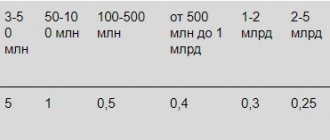Supply contract
- this is a special case of purchase and sale, which is addressed in Chapter 30 of the Civil Code. Under a supply agreement, a supplier-seller engaged in business activities undertakes to transfer, within a specified period or terms, the goods produced or purchased by him to the buyer for use in business activities or for other purposes not related to personal, family, home and other similar use (Article 506 Civil Code of the Russian Federation). The main responsibilities of the buyer when purchasing goods are acceptance of goods and payment for them (Article 516 of the Civil Code of the Russian Federation). That is, both parties to the supply agreement must be business entities.
On a note
If the party to the purchase and sale is a private person purchasing goods from a seller-entrepreneur for personal, family, home and other similar use, then in this case a relationship arises within the framework of a retail purchase and sale agreement. The buyer's rights under such an agreement are regulated by the Consumer Protection Law.
Thus, the main violations under the supply agreement on the part of the supplier are delays in delivery, failure to notify the buyer about the readiness and shipment of goods, violations of the agreement on the quantity, quality, assortment and completeness of goods, as well as conditions on containers and packaging. On the buyer’s part, this means late payment for goods and refusal to accept them.
Choosing a claim procedure
For a supply contract, the Civil Code determined its essential conditions (without them, this contract is considered not concluded) (Article 432 of the Civil Code of the Russian Federation). These are the conditions relating to the subject of the contract:
- Name of product;
- quantity of goods.
In addition to these two conditions, in practice, the assortment and completeness of the goods, the delivery time, as well as any other conditions that the parties consider significant and are written down in the contract are considered essential. First of all, such conditions may be the price of the goods and the payment term.
Failure to comply with any of the terms of the contract has a negative impact on the financial and economic activities of both the buyer and the supplier. Therefore, one of the clauses of the contract can stipulate methods for pre-trial settlement of controversial issues. This will allow you to know exactly when the claim needs to be submitted, and within what time the counterparty must respond to it, which means that the conflict situation can be resolved without wasting money and time on legal proceedings.
For your information
A claim can be submitted regardless of whether it is provided for in the contract or not. But if the supply agreement provides for a claim procedure, then without compliance with it the court will not consider your claim (Resolution of the Federal Antimonopoly Service of the Volgo-Vyatka District dated February 13, 2013 No. A29-923/2012).
So, you have agreed with the counterparty under the supply contract on the claims procedure for resolving controversial issues. In the contract you can write something like the following:
<…>
6. Dispute resolution
6.1. All disagreements and disputes arising during the execution of this Agreement are resolved by the parties through negotiations in compliance with the claims procedure.
6.2. If a claim is received, the party is obliged to consider it and send a response to the party making the claim within 10 business days from the date of receipt of the claim.
6.3. If the claim is left without consideration, as well as in the event of refusal to satisfy it (full or partial), the party that sent the claim, within 30 business days from the date of receipt of the claim by the other party, has the right to submit the dispute for consideration to an arbitration court.
<…>
Claims can be made by both parties that are parties to the supply agreement. Let's look at how to handle claims against a supplier who is not receiving their money.
What types of penalties are there?
The creditor has two ways to collect the resulting debt:
- claim (pre-trial) procedure;
- judicial procedure;
It should be noted that both of these methods cannot be considered as two separate ways of resolving a debt collection dispute. Or rather, they are interconnected and consistent. In some cases, the legislation establishes the impossibility of going to court without taking pre-trial measures to resolve the dispute (for example, these are disputes under contracts for the carriage of goods, transport expeditions).
A mandatory claim procedure may also be specified in the contract. In any case, you should not neglect the claim procedure for resolving a dispute - this will help save time and money, as well as “relieve the load on the courts.”
The judicial path to resolving a dispute begins with the filing of a statement of claim in court and ends with the receipt of a writ of execution. After receiving the writ of execution, it must be handed over to the bailiffs and then the long process of enforcement proceedings begins.
As mentioned earlier, the entire legal procedure from the moment the claim is filed until the debt is received can take many years, which is a very disappointing fact.
So that receivables do not exceed revenue
In practice, the supplier’s claims work does not always mean issuing a claim to the buyer. This action can be the final stage of the claim work, and before that it is work with debtors to reduce their debts to your company. It is no secret that cash receipts from counterparties are the company’s main sources of financing. And if shipments are made systematically, and at the same time systematically do not receive money for it, accounts receivable will exceed revenue. And this will indicate your unstable financial situation and may even lead to bankruptcy.
Claim work begins a few days before the payment deadline - of course, after notifying the buyer about shipment and issuing an invoice for payment. The buyer needs to be reminded that he must make payment for the shipped goods within the established period. This can be done by email (preferably with a message read receipt) or by phone.
If payment is not received on time, you can send an official notification letter stating that the counterparty is in debt under the supply agreement and that in case of non-payment the company will be forced to take countermeasures (for example, suspend deliveries). A statement of reconciliation of mutual settlements should be attached to the letter. If the debtor signs it, it will mean that he acknowledges his debt.
Well, if he still doesn’t pay off his debt, you can start filing a claim.
Note that Article 395 of the Civil Code establishes liability for failure to fulfill a monetary obligation. Therefore, it is not necessary to separately stipulate in the supply agreement the payment of interest in the event of non-payment of goods by the buyer. But in the calculation for the use of funds, you must indicate the amount of interest as of the date of calculation (the date of the claim).
It is important to know
The claim must be made in writing, signed by the manager and stamped (if any), on company letterhead. In general, the text should contain:
- details of the organization to which the claim is sent;
- reasons for making claims;
- references to violated legal norms, clauses of the contract;
- elimination requirement and deadlines;
- the amount of the claim, if expressed in cash;
- details of the claimant;
- list of documents attached to the claim.
The supplier's claim to the buyer about late payment for the delivered goods, payment and interest may look like this:
Sample:
| LIMITED LIABILITY COMPANY "VECTOR" INN/KPP 5015023512/501501001, 156789, Moscow, st. Semenova, 12, tel. 256-45-12, email. mail LLC "Mix", 456789, Moscow region, Podolsk, st. Lesnaya, 2 Requirement (claim) on payment of debt under a supply agreement due to failure to fulfill obligations to pay for goods Vector LLC, in accordance with clause 2.1 of the Supply Agreement dated January 22, 2014 No. 17/1, on pre-delivery terms transferred the following goods to Mix LLC on January 28, 2014 in the agreed volume: - office chair “Universal” in the amount of 5 pieces, in the amount of 65,000 (Sixty-five thousand) rubles within the time period established by the contract, which is confirmed by the consignment note dated January 28, 2014 No. 17/1. According to clause 2.2 of the Supply Agreement dated January 22, 2014 No. 17/1, Mix LLC makes payment within 10 days from the date of receipt of the goods. The cost of the transferred goods (including VAT 18% - 9915 rubles) is 65,000 (Sixty-five thousand) rubles. According to clause 2.2 of Agreement No. 17/1, payment must be made until 02/07/2014 inclusive, but the money has not yet been received. Clause 6.1 of the Supply Agreement dated January 22, 2014 No. 17/1 provides for a claim procedure for resolving disputes; The deadline for responding to a claim is 15 calendar days from the date of its receipt. Based on the above and guided by clause 6.3 of the Supply Agreement No. 17/1 dated January 22, 2014, Article 516 of the Civil Code, we request you to pay the debt in the amount of 65,000 (Sixty-five thousand) rubles by April 30, 2014. Within the same period, please pay the amount of interest for the use of other people's funds on the basis of Article 395 of the Civil Code for the period from 02/08/2014 to the day of transfer of the debt amount (the calculation is given in the table). If you disagree with this claim, submit a written, reasoned response. Based on clause 6.3 of the Supply Agreement No. 17/1 dated January 22, 2014, if this claim is left without consideration, as well as in the event of refusal to satisfy it (in whole or in part), within 30 working days from the date of receipt of the claim by the other party, the dispute will be submitted to the arbitration court for consideration. Calculation of the amount of interest for the period from 02/08/2014 to 04/07/2014: | Bank refinancing rate (%) | Amount of fines per day (RUB) (gr. 1 x gr. 3/ 360) | Amount of penalties for the entire period (RUB) (gr. 2 x gr. 4 ) | |
| 1 | 2 | 3 | 4 | 5 |
| 65 000 | 59 | 8,25 | 14,9 | 879 |
Thus, the total amount of this claim is RUB 65,879. (sixty-five thousand eight hundred seventy-nine rubles 00 kopecks), including:
- cost of goods subject to payment - 65,000 rubles;
- the amount of interest is 879 rubles.
Applications:
1. copy of the Supply Agreement dated January 22, 2014 No. 17/1; 2. copy of the invoice dated January 28, 2014 No. 17/1; 3. copy of the invoice for payment dated January 28, 2014 No. 17/1; 4. Power of attorney of the representative dated 04/07/2014 No. 12.
07.04.2014
Head of Vector LLC Gromov / B. G. Gromov /
MP
Let’s imagine the supplier’s claims process in the form of a diagram:
The buyer's claims work is much more complicated than that of the supplier, and is associated with a large number of actions when accepting the goods. We will talk about this in the next issue of the magazine.
Olga Kruzhilina,
Editorial Board of the magazine "Practical Accounting"
Lawyer at the enterprise
With the “Lawyer at the Enterprise” berator, you will easily resolve any conflict with counterparties and pass any inspection procedure with honor. You will also quickly find the form of any document, the required article of law, and an example from arbitration practice. Find out more about the publication >>
If you have a question, ask it here >>
How to properly submit a pending claim?
According to generally established rules, there are several ways to transfer a claim to a second party:
- Hand over the document in person. If you select this option, check for a receipt stamp on your copy. One must consist of the personal signature of the counterparty, its transcript, date, seal and job title of the person who accepted the claim. The second option is also possible: date and registration number of incoming correspondence;
- Send by fax or email. This option is possible when the parties have provided for this method of communication in the contract. Don't forget to print the letter, as well as the shipping report.
- Send by registered mail with notification of arrival to the addressee. The letter must be sent to the legal address of the organization. Finding it, as a rule, will not be difficult: you can do this on the Internet on the official website of the Federal Tax Service or find information about the other party in the agreement. Don't forget to take the receipt, inventory and delivery notice from the post office.
Expert opinion
Musikhin Viktor Stanislavovich
Lawyer with 10 years of experience. Specialization: civil law. Member of the Bar Association.
Remember that you may need any documents confirming the delivery and storage of the claim by the counterparty in the event of further legal proceedings. That is why do not forget to save them until the circumstances are fully clarified.
The main reason to send a document such as a claim to the buyer is non-payment of funds. Most of us believe that this is even the only case of failure by the buyer to fulfill its obligations.
But it is not so. When a claim can be filed with the buyer, what requirements the seller can include and possible negative consequences for failure to fulfill obligations - we will talk about this in detail.
You can also use universal information on debt collection by sending a claim to the debtor.
Like a claim to the seller, this type of document is used as a method of pre-trial dispute resolution, and the basis of which is the conclusion of a purchase and sale agreement. By the way, such a document can be used by the seller as an argument and evidence in a civil case as part of the consideration of claims for the protection of consumer rights - to prove the fact of proper performance of their duties and abuse of consumer rights.







